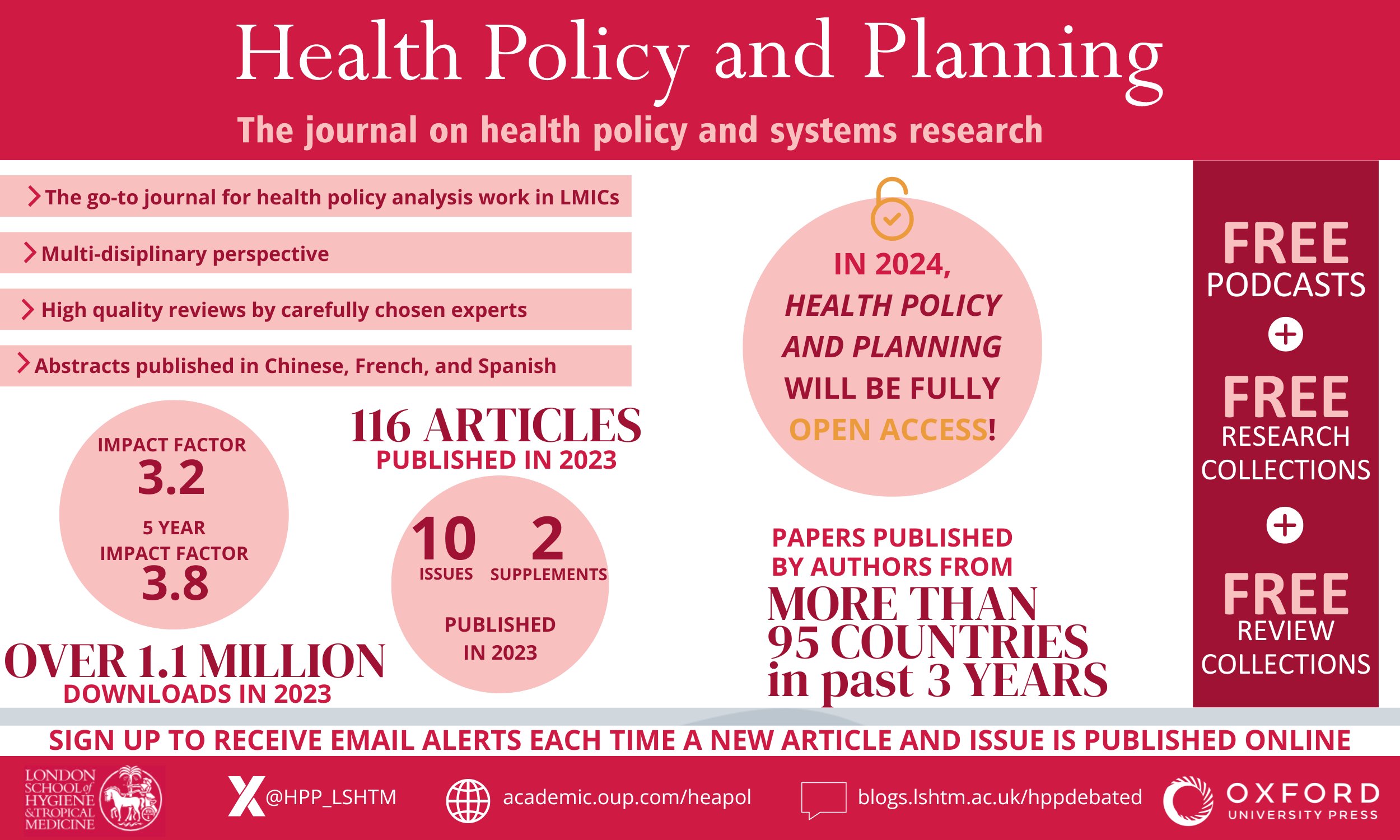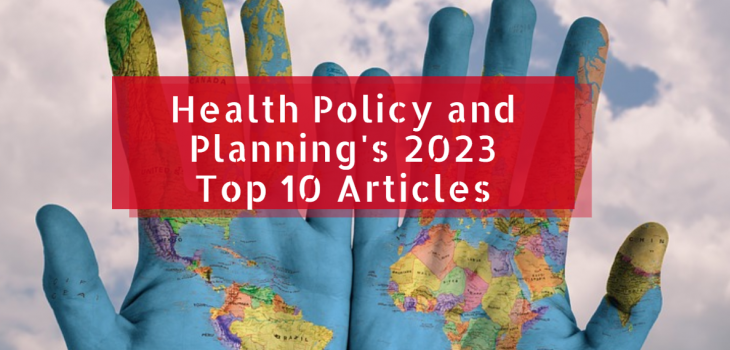By Natasha Salaria (London School of Hygiene & Tropical Medicine)
Health Policy and Planning is an open access journal publishing health policy and systems research focusing on low- and middle-income countries. The journal consists of four sections; Health Systems Research, Health Economics, Health Policy Processes and Implementation Research and Evaluation.
In 2023, our impact factor was 3.2 and on 1 January 2024 we transitioned to a fully open access journal. We appreciate that submitting to journals can be overwhelming with each journal having different guidelines for submission. We aim to break this down for you at Health Policy and Planning to make preparing your manuscript and submission as straight forward as possible. We have created video resources with our top ten tips for authors submitting to HPP and reviewers reviewing an article too.
We had a busy year leading to publication of three supplements and one ongoing call for papers on climate change and health:
- Rethinking external assistance for health
- Procedural fairness in health financing for universal health coverage: why, what and how
- Reimagining health systems for better health and social justice
- Call for papers: Climate change and health
As usual we kept up with our podcasts and continue to make these accessible and visible to all, discussing published papers in the Journal with our authors. This also goes for our hand-picked content by the editors of Health Policy and Planning which you can access as Editor’s choice articles here.
Below you can find our top most cited, downloaded and most accessed content in the past year from content published in 2023. We continue to thank our valued Section Editors, reviewers and authors for their dedication to HPP and contribution to the publication of high-quality research.
Top Cited
- Barriers to cervical cancer and breast cancer screening uptake in low- and middle-income countries: a systematic review [LINK]
- Context and priorities for health systems strengthening for pain and disability in low- and middle-income countries: a secondary qualitative study and content analysis of health policies [LINK]
- Scaling-up through piloting: dual-track provider payment reforms in China’s health system [LINK]
- Factors influencing the prioritization of vaccines by policymakers in low- and middle-income countries: a scoping review [LINK]
- Risk governance in the response to global health emergencies: understanding the governance of chaos in Brazil’s handling of the Covid-19 pandemic [LINK]
- Understanding medical corruption in China: a mixed-methods study [LINK]
- Catastrophic health care expenditure and impoverishment in Bhutan [LINK]
- Willingness to pay for a National Health Insurance Scheme in The Gambia: a contingent valuation study [LINK]
- Evaluating health policies with subnational disparities: a text-mining analysis of the Urban Employee Basic Medical Insurance Scheme in China [LINK]
- What accounts for the different regional responses to COVID-19 in China? Exploring the role of institutional environment, governance capacity and legitimacy [LINK]
Top Downloaded
- How to do (or not to do)…how to embed equity in the conduct of health research: lessons from piloting the 8Quity tool [LINK]
- Political economy analysis of sub-national health management in Kenya, Malawi, and Uganda [LINK]
- What is the impact of forced displacement on health? A scoping review [LINK]
- Benefits and Challenges of Consolidating Public Health Functions into a National Public Health Institute: A Policy Analysis [LINK]
- Do private health providers help achieve Universal Health Coverage? A scoping review of the evidence from low-income countries [LINK]
- The utilisation of systematic review evidence in formulating India’s National Health Programme guidelines between 2007 to 2021 [LINK]
- Purchasing for High-Quality Care Using National Health Insurance: Evidence from Zambia [LINK]
- Using intersectionality to study gender and antimicrobial resistance in Low- and Middle- Income Countries [LINK]
- Bringing an end to the silence: Identifying priorities and solutions to addressing the mental health consequences of Child Marriage [LINK]
- Understanding medical corruption in China: a mixed-methods study [LINK]
Top Altmetric
- Understanding communication in community engagement for maternal and newborn health programmes in low- and middle-income countries: a realist review [LINK]
- Inequities in spatial access to health services in Ghanaian cities [LINK]
- Do private health providers help achieve Universal Health Coverage? A scoping review of the evidence from low-income countries [LINK]
- How to do (or not to do)…how to embed equity in the conduct of health research: lessons from piloting the 8Quity tool [LINK]
- Policymakers’ perspective on the importance of procedural fairness to implement and sustain health financing reforms [LINK]
- Doctors for the people? The problematic distribution of rural service doctors in Ecuador [LINK]
- Understanding medical corruption in China: a mixed-methods study [LINK]
- The utilisation of systematic review evidence in formulating India’s National Health Programme guidelines between 2007 to 2021 [LINK]
- Health equity: access to quality services and caring for underserved populations [LINK]
- Determinants of initiation, continuation and cessation of smokeless tobacco use among pregnant and lactating women: a qualitative study from low-income communities in urban India [LINK]












